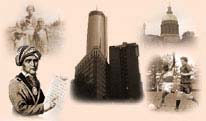Thematic Content
KCAC teachers and their students in every city around the U.S. study ways that American communities have been formed in varying times and place.
Reclaiming Displaced Heritages:recovering aspects of history and local culture that could be undervalued or misunderstood by future generations
Cultivating Homelands:shaping the natural environment and drawing upon it for support, while honoring traditions of shared rural life
Educating for Citizenship:developing schooling approaches that prepare community members for active engagement in America's democratic governments
Building Cities:designing vibrant living spaces that bring urban work and play together to represent core values of communal culture
Shifting Landscapes, Converging Peoples:re-configuring contemporary suburban landscapes and social practices to balance a region's local heritage with newcomers' cultural contributions;
While organizing their work around one or more of these general themes, KCAC teachers and students often focus on specific instances of productive tension between regional and national culture and the formation of distinct periods when particular groups were trying to reconcile aspirations for being "American" with specific local concerns, values, and social practices.
For instance, in Georgia, a particular application of the "Reclaiming Displaced Heritages"
theme has been to recover the story of the Cherokee in the northwest part of the state--prior to, during, and after their forced Removal. Among other things, this study has examined why some Cherokee in Georgia sought to "Americanize" their clothing, homes, writing, and other community practices in the hope of being accepted by the new white men's nation.
Along similar lines, for the "Building Cities" theme, Georgia participants focused first on
Atlantans' efforts to invent a strong identity for their city in the years between WWII and the close of the twentieth century. In particular, this inquiry group studied the creation of numerous Atlanta cultural institutions (e.g., museums, historical centers) clearly reflecting community members' desire to claim a national/international vision for the city.
© 2000-2001 KCAC
No materials on this website should be copied or distributed
(except for classroom use) without written permissions from KCAC.
Questions? Comments? Contact KSU webmaster
Jim Cope.

